In Arkansas there are currently eight men on death row. Their convictions were between 1990 and 2000, and they have therefore been there between 17 and 27 years each. The Arkansas authorities plan to execute two per day on four days before the end of April. Two got a temporary stay just before their executions were due on 17 April, but Arkansas still plans to carry out their sentences before the end of the month. At the time of writing, all now have temporary stays, but the situation is constantly changing.
So why the hurry? The method of death in Arkansas is lethal injection. (See here for how it works.) European pharmaceutical companies will no longer sell medication for use in executions, and nor will most USian companies. The Arkansas supply of Midazolam, one of the three drugs in the lethal injection process, expires on 1 May 2017. Therefore, Arkansas is in a hurry to kill their death row inmates in case they can’t get any more Midazolam.
At least one of these eight men has been consistent in maintaining his innocence and there may be DNA evidence to prove this. A second appears to only be on death row because an appeal was struck down on a technical issue. Another is seriously mentally ill and at least two more have mental health issues. A sixth appears to have genuinely found religion and become a better person. Personally, I think all the sentences should immediately be commuted to life imprisonment.
The death penalty, like healthcare and gun control, is another of those areas where the US is unlike most Western democracies. The rest of us no longer have the death penalty. Further, in my opinion, the death penalty is by definition “cruel and unusual punishment” and therefore unconstitutional in US law.
The Death Penalty in New Zealand
The punishment of hanging for murder and treason came to New Zealand along with British Law on the signing of the Treaty of Waitangi in 1840.
Only one woman was ever hanged in New Zealand – the infamous Minnie Dean in 1895, aka the Winton baby farmer. There’s a myth Dean is so evil nothing ever grows on her grave, and I’ve met very intelligent people who believe that. Lynley Hood’s book, Minnie Dean: Her Life and Crimes notes that due to the number of visitors to Dean’s grave it gets regular attention; that includes spraying it with weed killer to keep it clear.
Many years ago I upset someone a great deal when she told me the story of Dean’s grave. I laughed, not realizing she believed what she was telling me. I didn’t believe the myth before I read the book, but I had when I upset this person, who was from near Winton herself. But, she was so affronted by my reaction that I knew she’d feel even worse if I was a know-it-all on top of laughing at her. So I held my peace during her assurances it was true.
There was also only one treason conviction: Hamiora Pere in 1869. He was one of Te Kooti’s men in the New Zealand Land Wars. It seems Pere’s killing was little more than a threat to other Māori not to rebel against the British crown. These days, his conviction is seen as unsafe.
The last victim of the death penalty in New Zealand was in 1957. 1961 saw its elimination as a punishment for murder and its abolition altogether came in 1989.
The Death Penalty Around the World
Below is the status of the death penalty worldwide as at October 2015. There is only one European country that still has the death penalty: Belarus. Most countries that retain it are Muslim-majority. The US is a significant outlier on this issue.
The Worst Offenders
According to Amnesty International, it is likely the Chinese government kills the most of its citizens each year. However, as they never provide official figures confirmation of this is not possible. A couple of weeks ago Amnesty International released their annual report on the death penalty worldwide for 2015. They begin with the stark reality that 2015 saw the executions of “at least 1,634 people … in 25 countries in 2015”. They continue:
This represents a stark increase on the number of executions recorded [in] 2014 of more than 50%; in 2014 Amnesty International recorded 1,061 executions in 22 countries worldwide.
This is the highest number of executions recorded in more than 25 years (since 1989).
Most executions took place in China, Iran, Pakistan, Saudi Arabia and the USA – in that order.
China remained the world’s top executioner – but the true extent of the use of the death penalty in China is unknown as this data is considered a state secret; the figure of 1,634 excludes the thousands of executions believed to have been carried out in China.
Excluding China, almost 90% of all executions took place in just three countries – Iran, Pakistan and Saudi Arabia.
The Current Situation in the United States
In 2015, there were 28 executions in the US according to the Death Penalty Information Center. Almost half of those (13) were in Texas. Six more were in Missouri, five in Georgia, two in Florida, and one each in Oklahoma and Virginia.
In general, it seems that most US states are getting rid of the death penalty. It’s already gone in nineteen states and 26 more haven’t had a death penalty conviction in five years. However. it wasn’t until 2005 that the US got rid of the death penalty for minors. At the time there were only twelve other countries that theoretically retained the death penalty for children though most of those didn’t use it. Some of those have since also got rid of it.
The general public in the US still largely supports judicial murder. Gallup have been tracking public opinion on this since 1937, and in early 2016 there was 60% support for the death penalty.
The Pew Research Center also makes regular surveys of the USian attitude to the death penalty. Their data have always been roughly similar to those of Gallup. Recent results show support is continuing to reduce significantly. At 49% in September 2016, this latest result is almost as low as the 1966 nadir. (I would like to know what was going on in 1996 to produce 80% support though!)
Support for the Death Penalty by Religion
Many religions in the US have an official position on the death penalty, as they do on most moral issues.
Like most moral issues (e. g. contraception, abortion, divorce, same-sex marriage), a religion’s adherents do not necessarily follow their church’s teachings though. This is just as true for the death penalty as many other issues. For example, while the Southern Baptist Convention supports the death penalty, only around 71% of their adherents do. While that is above the national average, it still shows that for many it’s not something they are comfortable with. Catholic support for the death penalty sits around 50%, while the Church itself is against it. White Catholics support it at much higher levels – over 60%.
Blacks and Latinos, whatever their religion or lack thereof, are much less likely to support the death penalty than Whites. I suspect this is because so many more Blacks and Latinos face execution and more significantly, have more often been the victim of wrongful conviction in death penalty cases.
The Death Penalty Information Center has a page ‘50 Facts About the Death Penalty‘. They include:
* A North Carolina study found that the odds of receiving a death sentence were 3.5 times higher if the victim …
* Over 75% of capital cases resulting in an execution involved white victims … only about 50% of murder victims are white.
* Since 1976, there have been 293 black defendants executed for killing a white victim, while 31 white defendants have been executed for killing a black victim.
* African-Americans make up 42% of the death row inmates, but represent only 13% of the general population.
* In three states, racial minorities make up over 70% of death row inmates: Delaware, Texas, and Louisiana.
(See below for more of the Center’s facts.)
The Death Penalty and Atheism
Atheism has no doctrine and atheists are free to make up their own minds about the morality of judicial murder. For myself, I’ve always been instinctively against it and a majority of atheists feel the same.
There are, of course, some people for whom rehabilitation will never work. It seems to me these are usually the perpetrators of sexual crimes, especially paedophilia, rather than murder. They see themselves as loving children and therefore find it hard to understand they did something wrong. I accept that for the safety of the majority we must keep the unrehablitatable (is that a word?) away from society for life. However, I think the killing of another human being, no matter how repugnant, is a step too far.
In the US in 2015, atheists, agnostics and nones combined were 48% in favour of the death penalty and 45% were in opposition according to Pew. I don’t know the figure for atheists on their own, but in the US their support for the death penalty tends to be lower as a group.
Death Penalty and Political Affiliation
In general the more conservative a person’s political views, the more likely they are to support the death penalty. Republicans are also more likely to support it than Democrats. The partisan gap is widening as well – as it is on just about every other topic in US politics.
As Pew points out, most of the change in the US view over the years is amongst Democrats. There has only been a ten point reduction in support by Republicans in twenty years. On the other hand, the support of Independents has seen a 22 point reduction and Democrats a 31 point reduction.
Some demographics within Democrats also saw a much bigger reduction than others according to Pew. For example, in the four year period from 2011 to 2015, those who call themselves liberal Democrats saw an eleven point reduction in support. But, those who say they are conservative or moderate Democrats saw only a seven point reduction.
In a discussion of the situation in Arkansas Charles Krauthammer said on Fox News’s ‘Special Report’ on 17 April 2017:
Charles Krauthammer (Source: Fox News)
I think it’s healthy to see the gradual abolition of the death penalty. … I think it’s a mark of a civilized society to enforce order at the lowest level of violence. If you can do it at a level where you don’t execute, I think it’s a mark of civilization.
( I believe the conservative Republican Krauthammer is an atheist of Jewish descent.)
I can only agree.
Abolishing the Death Penalty
I think there a certain issues governments need to take a lead on, whatever the views of the majority. Majority opinion doesn’t make it correct, and the rights of minorities also have to have protection. We all know there are some states where inter-racial marriage would probably still be illegal if it was left up to the majority.
There are still several US states where the conservative Christian majority strive to force their moral opinions onto everyone else. They frame the battle as both state’s rights and freedom of religion. Further, they insist their point of view is the Christian point of view, completely ignoring all those Christian religions for which it isn’t dogma.
Most recently this has seen a plethora of so-called “bathroom bills” which require transgender people to use the bathroom for the gender on their birth certificate.
Basically who the f*** do they think they are? It’s only because they are the majority that they get away with their actions. Legislators are put there by the majority, but their role is to look after all their constituents, not just the majority. They should also be big enough and responsible enough to look at the big picture. Some freedom of religion bills in states didn’t get signed because people pointed out that they would also apply to Muslims, for example.
Virtue-Signalling
When there is a moral issue that requires legal intervention, a legislator needs to ensure that their opinion isn’t determined by their religion. It is the Constitution that must come first. For too long, especially in countries where religion is dominant, multiple law-making bodies have shown more concern to virtue-signal to their own supporters than do the right thing. For example, Alabama chief justice Roy Moore has just lost another round in the courts to get back his seat on the bench. Justice Moore’s removal from the bench was due to his refusal to remove a Ten Commandments monument he put up in his courthouse rotunda. The lawyers supporting him are the same ones supporting Kim Davis, the law clerk who went to jail rather than issue marriage licences to same-sex couples.
Virtue-signalling has recently become a major problem on the far left, but it has actually been around for a long time on the right. And, it is still occurring. The plethora of laws introduced in recent years to make obtaining an abortion more difficult are just one example. Many were thrown out by appellant courts and even the Supreme Court.
But, they should never have got there. If you don’t want an abortion, don’t have one. In a Western democracy, no one will force you to. At the same time, you shouldn’t be able to prevent another person to have one just because you find it morally objectionable.
If you don’t want to marry someone of the same gender, you don’t have to do that either. Again, no one will make you. If you’re a woman though, there are still communities, including many Christian ones, where girls and women and forced into marriage with a man against their will. How about concentrating on that instead of interfering in the bedroom during adult consensual sexual acts that aren’t hurting anyone?
Death Penalty Information Center
I urge you to have a look at the data at the Death Penalty Information Center website. Even if you feel that there is moral justification for the use of the death penalty, there are many reasons why we still shouldn’t do it.
Basically, as human beings we just get it wrong too often. Some more of the facts from the Death Penalty Information Center are:
* Since 1973, 153 people have been exonerated from death row.
* At least ten people have been executed despite serious doubts about their guilt.
* Six of the seven [death row] exonerations occurred at least 30 years after the inmate’s conviction.
* A 2014 poll by the Washington Post and ABC News found that a majority of Americans (52%) prefer life without parole as a punishment for murder, with just 42% preferring the death penalty.
* The average cost for just the defense at trial in a federal death penalty case is about 8 times that of non-capital murder case.
Deterrent Effect
* In a national survey, US police chiefs ranked the death penalty last in their priorities for effective crime reduction.
* The South has consistently had the highest murder rate while accounting for 80% of the country’s executions.
* The Northeast has consistently had the lowest murder rate, while accounting for less than 1% of the country’s executions.
My hope is that the reduction in the availability of drugs, the realization that it’s too easy to make a mistake in convicting someone, the recognition that it’s not a deterrent, and the understanding that some people are on a path to murder before they are born, will see the USA abolish the death penalty before too much longer. The people of the US have the capacity to understand these issues – if only prayer would work in changing them!
If you enjoyed reading this, please consider donating a dollar or two to help keep the site going. Thank you.


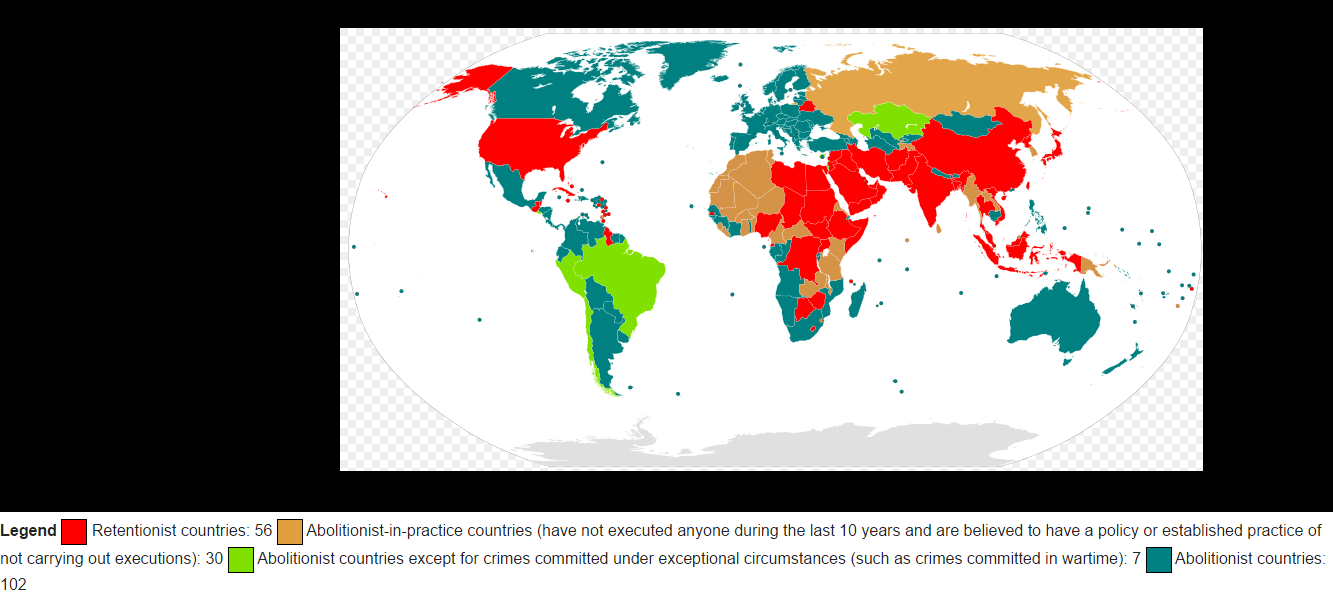
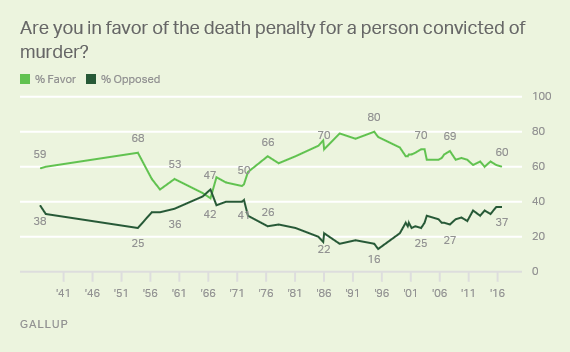
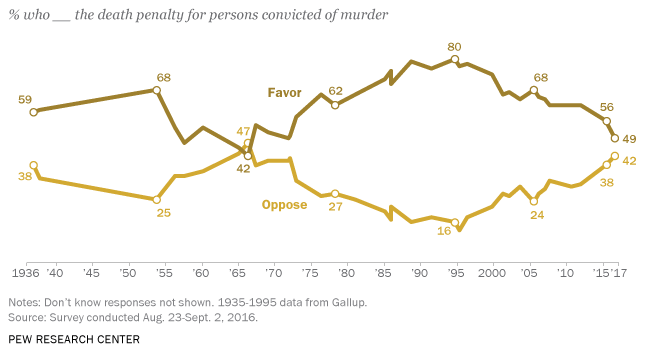
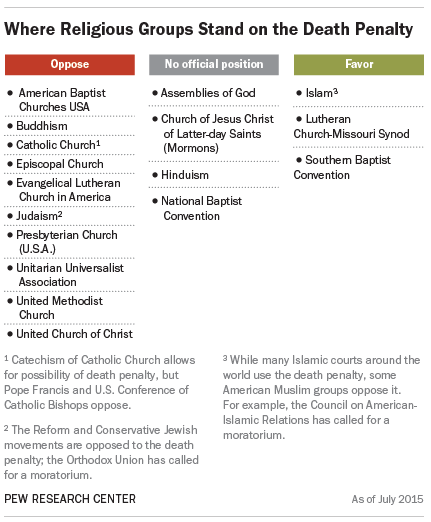
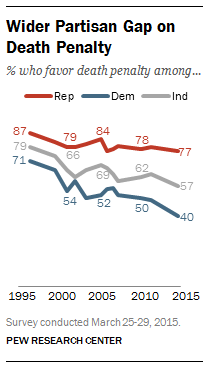

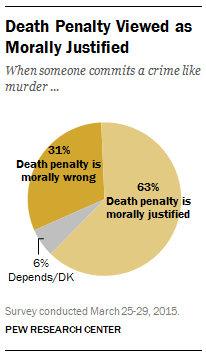
I urge people to google Damien Echols. Charlie Rose had a segment (about 45 min) on the other night about the death penalty and controversy in Arkansas with Echols. Echols spent 18 years on death row in Arkansas before he was exonerated by DNA evidence. Not only that, but he spent two additional years AFTER the DNA showed him to be innocent and only was released after taking an Alford plea (that’s where he admits no guilt but still accepts the conviction so that he can’t sue the state for wrongful actions to protect the state from financial liability and the cops and the prosecutors from prosecution for their actions).
I haven’t looked that up yet, but the deal strikes me as one attorney Asa Hutchinson (R), current governor of Arkansas, would come up with. He seems to be a complete a$$hol€. If nothing else, someone should get at least their potential income for the time they were in prison. That would probably be a lot less than the cost of keeping that person on death row.
Alford pleas are not unique to Arkansas. They are widely used in many states. For one thing, they let LEA keep that case in the “win” column. It dates back to 1970 and is named for the case of North Carolina v. Alford.
There are situations where I wouldn’t have a problem with their use. There’s been at least one case in NZ where a young man was convicted of murdering his entire family (parents and four siblings) where he later got off. Most people think he did it but much of the evidence that proved it was inadmissible and the house was burned down mysteriously before all forensic tests could be completed. He got compensation, though awards here are never as big as those in the US.
I can see they’d frequently be useful in lesser cases too.
However, it seems to me very unfair if someone is actually proven to clearly be not guilty. If they’re worried what it would cost them, that could be part of negotiations. Most people would take just about anything in exchange for their freedom.
I have to take issue with your last two sentences, Heather. If someone is “actually proven to clearly be not guilty”, then there should be no negotiation. They should be released immediately, with professional rehabilitation and psychiatric counselling, and full compensation for loss of earning and loss of freedom (and a full written apology). I imagine they would also need professional financial counselling, since the compensation could be sizeable.
Cheers,
Colin.
I agree they should be released immediately if they’re clearly not guilty. I meant compensation negotiations, not release negotiations. I meant I don’t think they should have to stay in prison while the negotiations are going on. I think it’s apalling anyone should have to stay a minute longer if they’re not guilty. Sorry I didn’t make that clear. My bad.
Ah, sorry, get it now. No worries.
Cheers,
Colin.
America just can’t seem to figure out what “civilized” means. Sometimes there are glimmers of hope, but only when Democrats have power. Republicans are hell-bent at keeping America an uncivilized and unenlightened country. Anyone who can’t see the discrepancy is grossly ignorant or simply delusional.
Thank you Heather for a very interesting post.
I’m opposed to the death penalty, but not whole-heartedly: life without parole is also cruel & inhumane and prolongs the suffering (however, most inmates on death row would still disagree, it seems).
Death can also give some kind of closure to victims (eg. family of a murdered loved one).
Of course there are many arguments against the death penalty, the strongest of which is (immo) that the call for the death penalty is strongest when emotions run high, but when emotions run high we are most prone to make mistakes. And once dead no ‘repairs’ for wrongful conviction.
Some crimes are so heinous and some psychopaths so unrehabitable that it really a lose-lose situation, whatever the punishment.
A question about that map, should not several states in the US be ‘brown’ rather than ‘red’?
And another question, is China also leading in executions per head? We know that China has about 50 times the population of, say, Saudi Arabia. Of course, as you point out, that would only be ‘admitted’ executions.
In NZ we have prisons with a separate compound for prisoners being kept inside for the safety of others even though their sentence is over. Each prisoner has his own house and garden. They are escorted to town to do shopping etc but look after themselves otherwise. Rehabilitation, counselling etc continues, but I don’t know if it’s compulsory.
I assume the map is like that for the US because the federal death penalty still applies everywhere.
Amnesty International don’t have reliable enough figures to know about China. They know there are executions, but have no idea how many. North Korea is another place where they don’t even know for sure there are executions, but they’re probably worse than everyone. Russia has a lot of people that die of mysterious illnesses in prison. There are suspicions about the real cause of death, but no proof.
I can’t let this thread lay low without agreeing wholeheartedly with Mark R.These repubs are a truly odious bunch.
Rachel Maddow weighed in on this the other night: https://www.youtube.com/watch?v=jbW80OE6Nyc
One of the eight men, Liddell Lee, has now been executed.The execution eventually went ahead because Neil Gorsuch broke the tie on the Supreme Court. His first significant decision was therefore to ensure someone was killed.
No, his decision was to follow the law within his limited powers. You and he and I may disagree with a law (and I do), but republican (small-r) self-government depends on strictly limited powers within each co-equal branch. We are supremely fortunate to have a new associate justice devoted to the rule of law and the Constitution.
Judges who trash the rule of law in their personal zeal to protect the abortion industry have ensured that millions of someones were killed.
There is no abortion “industry”. People do not get pregnant just so they can have an abortion, and certainly not to feed an industry.
Did you watch Maddow’s piece? Although it’s all relevant, the part on Arkansas isn’t that long and is at the beginning. She explains why killing people because your drugs are going to expire is not a good reason to go ahead. Some of these people still have arguments to make that would protect their lives. The justices appear to be voting in support of Arkansas because they support the death penalty. This is why it’s wrong for people to be selected for the court based on their political affiliation, left or right.
I don’t even know the names of the judges on NZ’s supreme court off hand, let alone their political affiliation. The same is true in most Western democracies. That’s because they judge based on the law, not politics. I do know those of your country because their decisions so often run on political or ideological lines, which doesn’t seem right to me. The decisions of many judges at lower levels also appear that way.
Imo, too many jobs are filled by political appointees or are voted into office so popularity becomes more important than competence. I don’t know how every voter can be expected to know who would be the best candidate for dog catcher or senior clerk.
In principle, we’re pretty much in agreement. As I’ve said, like you, I believe that judges ought to be selected based on Constitutional fidelity, ability to follow the law impartially, and due respect for the limits of their own power. A judge who is pleased with the outcome of all of his own rulings probably is a bad judge, as Justice Gorsuch has noted (quoting Justice Scalia).
Judicial nominations ought to be as independent of partisan politics as possible, and that was the case for most of our history. But then the power of the federal judiciary escalated dramatically in the 1960s with a series of increasingly dubious rulings. Courts seized the power to make laws and change the Constitution outside the amendment process. The radical left loved it at the time because they got to change the law and the Constitution without needing to win popular approval. The nomination process became the only available avenue for the people to push back and check the power of the courts.
Then in 1987 the Democrats, on orders from the abortion industry, blew up the traditional confirmation process once and for all with a vicious assault on Judge Robert Bork. The republic has yet to recover from this bizarre and disgraceful episode.
You can read some of the more controversial decisions, and decide for yourself which side more consistently follows the law impartially based on sound reasoning, and which side is more likely to employ an emotional and poorly reasoned argument to reach a predetermined outcome.
Justice Gorsuch is committed to follow the law as it is, not as he would wish it to be. I’m confident that’s what he did in this case. Again, I believe the law should be different. Direct, intentional state-sanctioned execution is wrong and should not be lawful at any stage of life: Not for the duly convicted, and not for the utterly innocent.
But the hypocrisy of phonies like Maddow and Breyer is a bit hard to take. If Mr. Lee had been executed 51 years ago, in utero — before he had had an opportunity to commit an offense of any kind, before a single appeal had been heard, without the benefit of one iota of due process (let alone 20 years worth) — we would not hear a peep from Maddow. Nearly a million Ledell Lees are executed year in and year out, and Maddow voices nothing but approval.
I don’t know enough about the history of your Supreme Court to know what the cause of the partisanship is. I would say that both those who are for and against same-sex marriage for example, consider themselves to be constitutionalists. Insisting it should be interpted the way the Founders imagined is like insisting the Bible be interpreted the way it was when it was written, which of course many do. Societies grow and evolve, and so should their laws. It’s a reason I wonder at the wisdom of such a document long-term. Our language will move on. What happens when the English of the future is as different as our English is from that of Shakespeare, Chaucer, or Beiwulf?
The best way to reduce abortion is high quality age appropriate sex education from a young age and promotion of the use and availability of effective contraception for ALL those who don’t want to get pregnant. The highest rates of both teenage pregnancy and abortion are in the Bible Belt, where local governments resist proper sex education in schools and making contraception more easily obtainable.
New Zealand, for example, currently has its lowest abortion rates for some time because of efforts to improve sex education and the availability of contraception to teenagers. Other countries have found the same.
Yes, times change, which is why there is an amendment process. That process has been invoked 33 times for the U.S. Constitution (including 27 ratified amendments and 6 not ratified). Additionally, according to the U.S. Senate web site, approximately 11,700 resolutions to amend the Constitution have been introduced. State constitutions are routinely revised, and many have been rewritten multiple times (Georgia’s on its ninth constitution, as is Louisiana, and that’s not counting Secession). Stable does not mean static.
Moreover, it’s entirely feasible to apply original intent to new circumstances; it does not take pretzel logic to realize that the prohibition on unreasonable search includes high-tech surveillance techniques that the founders could not imagine. However, it does not follow that a judge has the power to just make stuff up.
It would seem self-evident that a precondition for a peaceful and harmonious republic is a stable body of law that says what it means, means what it says — and means what the people, not a ruler, say it means.
Yes, of course each side in a case presents a legal argument that presumably they think is sound. (The adversarial system decrees that one side must be right and the other wrong; that’s another good reason to favor democratic sausage-making over judicial activism.)
You can judge for yourself the arguments in the Obergefell case: The four dissents are rigorous, lucid and devastating. The majority opinion is mealy-mouthed gibberish.
Personally I think it is perfectly logical that in a society that has advanced to accept same-sex couples, that same-sex marriage is also acceptable and they therefore have the same fundamental right to marry as per your constitution. It is also better for society for same-sex couples to be allowed to marry for multiple reasons.
I suppose that you think having to keep a gun in order to be a part of the militia means that since ?2005 it’s been okay for everyone to own a gun. That’s now an acid test for an originalist, but it’s only been law invented by SCOTUS for a little over ten years.